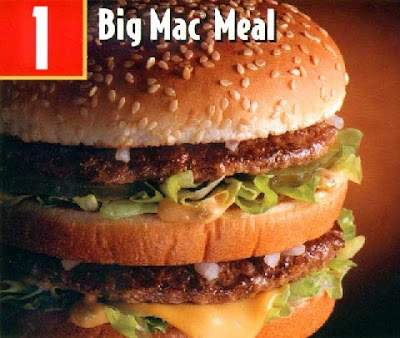 The Economist's Big Mac index is based on the theory of purchasing-power parity (PPP), according to which exchange rates should adjust to equalise the price of a basket of goods and services around the world. Our basket is a burger: a McDonald’s Big Mac.
The Economist's Big Mac index is based on the theory of purchasing-power parity (PPP), according to which exchange rates should adjust to equalise the price of a basket of goods and services around the world. Our basket is a burger: a McDonald’s Big Mac.The Big Mac Index is presumably useful because it is based on a well-known good whose final price, easily tracked in many countries, includes input costs from a wide range of sectors in the local economy, such as agricultural commodities (beef, bread, lettuce, tomatoes), labor (blue and white collar), advertising, rent and real estate costs, transportation, etc.
More on: Wikipedia, The Economist(including the index) and NRC Handelsblad (Dutch)
However, after a quick search, I discovered a webpage which told me Big Mac's aren't equal in different countries. Still, in my opinion, I belief the Big Mac index has it's purpose: It's making perfectly clear whether McDonalds is overpricing somewhere.

7 comments:
Not only the big mac's aren't equal in different country's. the culture isn't equal aswell. like in the netherlands mac donalds is for the poor people and like a fast food snack. Bin to Morocco some time ago and there it was a status symbol if you where rich enough to go to the mac.
Anyway
nice index and it sure shows where mac donalds overprice there shit. nice example that we don't pay the price a product costs. But we pay the price that we wanna pay for it.
I don't think you can see if it's overpriced, you don't pay much for the food itself. Labor and property costs are very different in different countries and those are not part of the basket. Or I just don't understand this PPP.
With the extra info in the post, you'll get an idea of what's inside the basket.
The Big Mac is the only thing in the basket, so the PPP shows the local currency big mac price ratio.
You can compare that with the currency exchange ratio and see where you get the most Big Macs for your money, but I don't see how the Big Mac PPP shows overpriced big-macs.
What if you live in New York and get payed twice as much for your job, but Big Macs also cost twice as much compared to city X? The Big Mac purchasing power (not PPP) is thus equal in New York and city X. A double priced Big Mac in New York is therefore not overpriced IMO. The Big Mac PPP does not say anything about this....
Indeed. In your example the burger is not overpriced. But what if the index does not match, for example in New York you pay 3 times as much?
This means there is a difference between the real exchange ratio and the ratio based on the Big Mac index.
Their can be 2 causes for this:
1) The currency exchange ratio isn't correct
2) The Big Mac index currecncy ratio isn't correct.
If other PPP's show the currency ratio is correct, only the second cause remains.
If so, why isn't the Big Mac priced the way it should be? There could be a lot of reasons for this. What if the country is a major producer of beef? Or what if there isn't enough competion on the burger market? What if they need to import a lot of ingredients (Iceland?)?
This leads to the Big Mac price, which can be higher or lower than what it should be, based on the PPP's & currency ratio.
Agreed, but it's all very subjective and based on "correct currency exchange ratios" based on different baskets of products etc.
Economics is fucking weird and complex.... It's too much based on (very complex)humans to model it in any detail.
It's still interesting though, but it always makes my thoughts go in loops. It's like a differential equation with an almost unlimited number of variables/dimensions.
yeah economics is complex. but i'm good in it! i didn't forget my pincode for 3 weeks in a row now!
Post a Comment